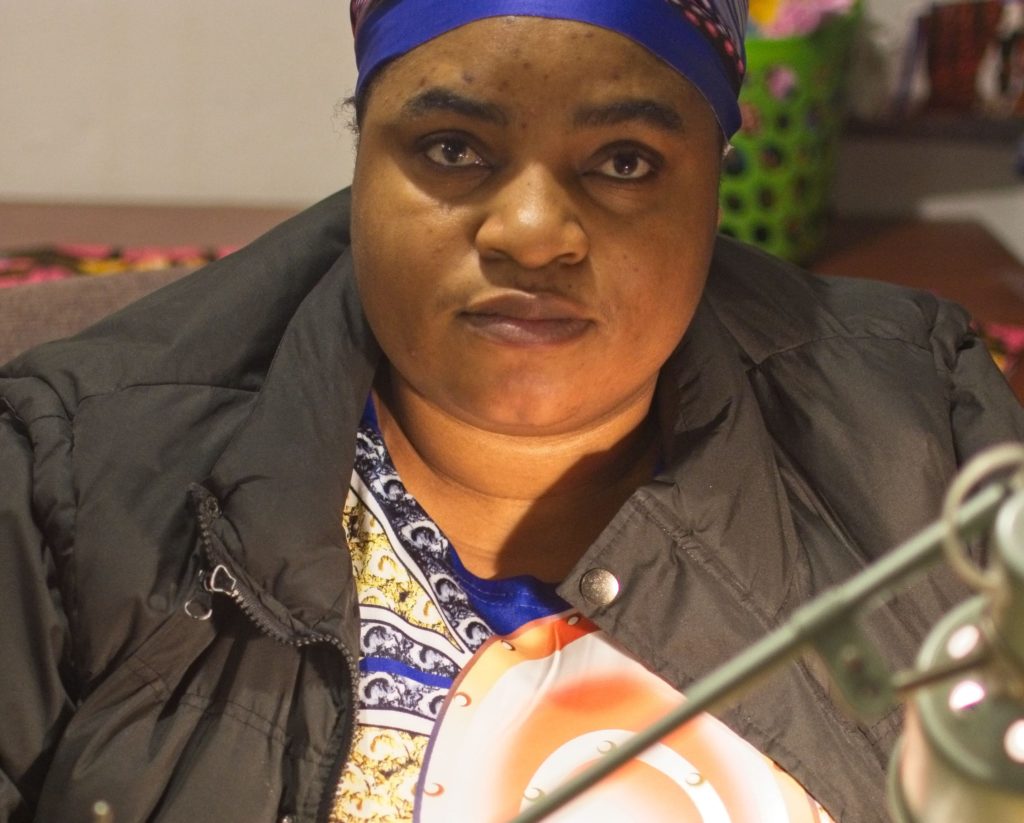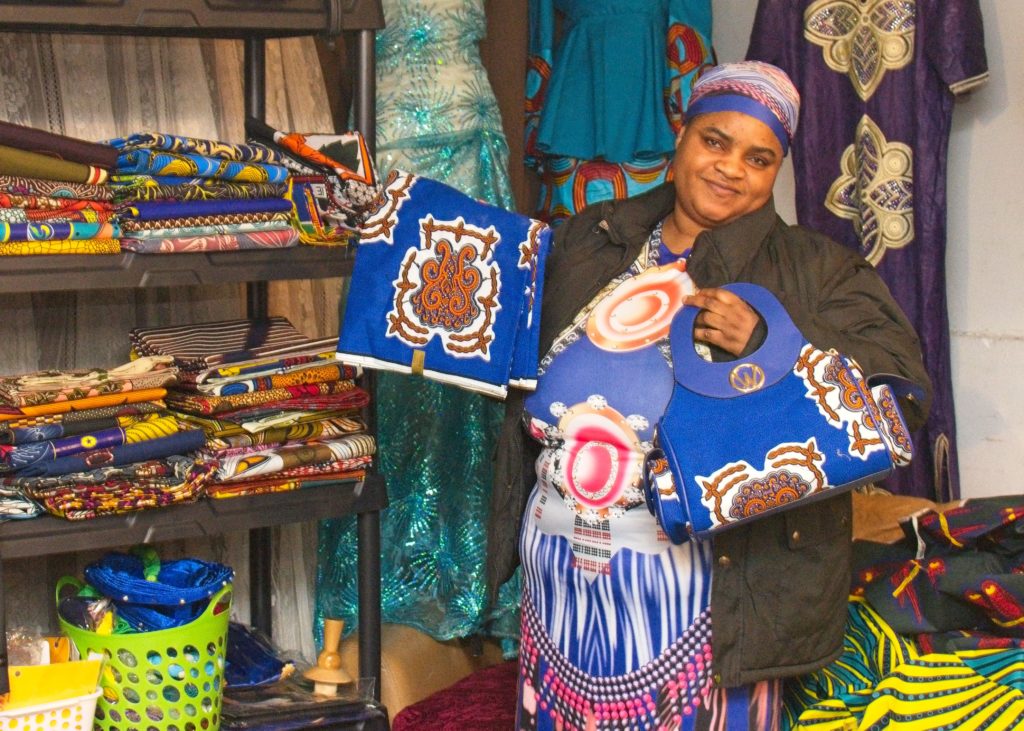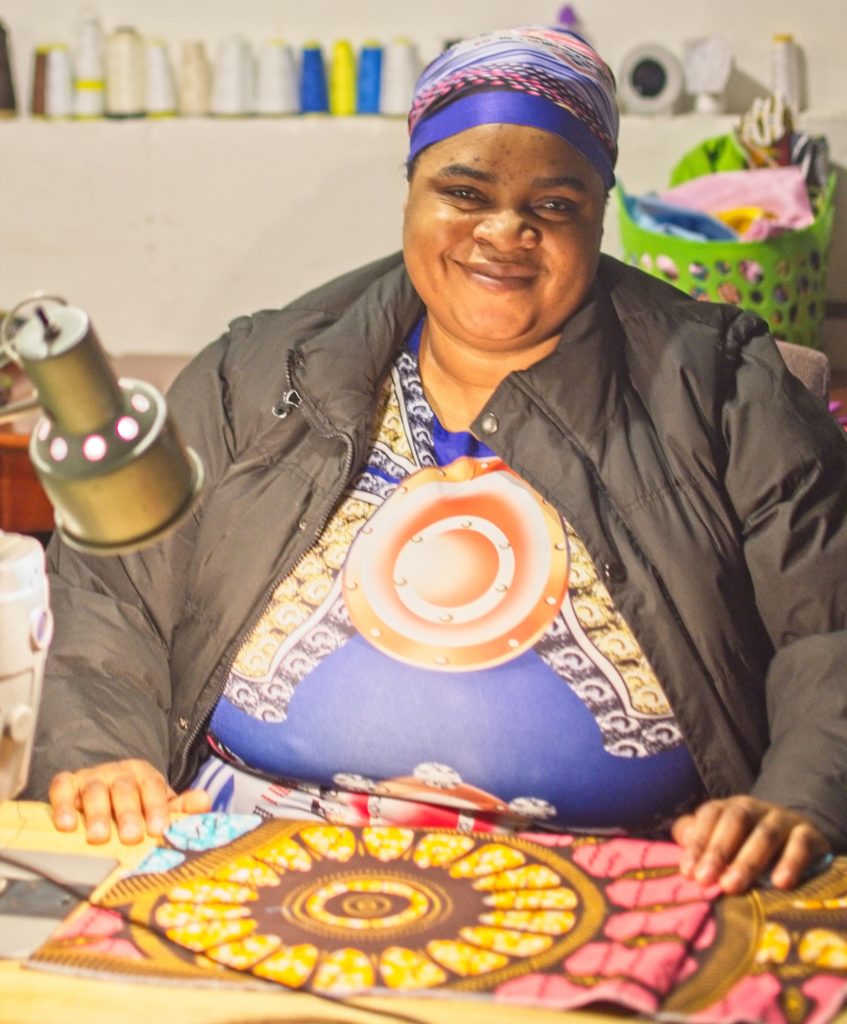
Liliane Lemani braves her cold garage to work on clothing she sells for her business, Designs by Liliane and Amisi. LEAVEN PHOTO BY JILL RAGAR ESFELD
Editor’s note: This article contains descriptions of violence that some readers may find disturbing.
by Jill Ragar Esfeld
jill.esfeld@theleaven.org
KANSAS CITY, Kan. — It is below freezing outside, and not much warmer in Liliane Lemani’s garage.
But she is grateful for what she has — a sewing machine in a frigid garage where she can bundle up and work to support her family.
At last, Lemani believes she is living God’s plan for her.
But her journey to this moment — from a rebel attack in the Congo to a cold garage in Kansas — is as harrowing as it is miraculous.
“Sometimes, I feel all those memories return,” she said. “The rebels came at night, they took my husband and I thought they killed him.
“They started asking me to give them money and beating me. We didn’t have any money. They beat me very bad.
“The year was 2005, and I was pregnant.”
Escape from the Congo
Not only was Lemani pregnant when the rebels arrived, but she had a 4 year old and an infant daughter with her, as well as her teenage niece.
Three rebels raped her niece while others grabbed the infant from Lemani’s arms, continuing to demand money.
“The rebel who took my baby was a girl,” Lemani said. “So, I thought she would have pity on my baby.
“But she put my baby down and stepped on it!”
When the rebels left, Lemani grabbed her baby, put her in a sling on her back and ran outside where she found her husband tied to a tree — beaten and stabbed, but still alive.
The family fled into the dark and walked all night until they reached a police camp. There, they told their story — and learned that Lemani’s baby had died along the way.
The shock of the discovery sent Lemani into labor, and she delivered her son prematurely.
But the police sent the family back out, telling them that down the road was a group of Catholics who might help them.
To this day, Lemani remembers the moment she came upon the Catholic Relief Services camp.
“They helped us with clothes, money, food,” she said. “They took care of my baby; gave him the vaccine.
“It is God’s blessing that the child survived.”
It was certain death for the family to return home, so Catholic Relief Services put them on a train bound for the Zambia border.
Once there, Lemani spent a week begging strangers for food to sustain her family.

A truck driver took pity on the group and drove them to an immigration port on the Nambia border.
He instructed Lemani to tell officials they were refugees.
“We didn’t have any documentation,” said Lemani. “I didn’t know English. When we went to immigration, I just kept saying, ‘Refugee, refugee.’
“They said, ‘What is she talking about?’ and I just said, ‘Refugee.’”
A Swahili translator was finally located, and the family was taken to a hospital and then to Nambia’s Osire refugee camp.
God has a purpose
“In the refugee camp, I knew I was safe,” said Lemani. “My worries were only what are we going to eat and where am I going to find clothes for my family?
“We stayed there for 12 years.”
During that time, Lemani educated herself with every tool available, including learning to speak fluent Portuguese, French and English.
“If you wanted people to help you,” she said, “you had to speak their language. So, I learned.”
And through a U.N. program, she learned to sew with such talent that she amazed her instructors.
She was also relentless in asking authorities at the camp to help her family move on to a better life.
“I bothered them,” she said. “I went there every day, asking, ‘I want anything that will help my family out.’”
And she never stopped praying.
“For all that happened to me in the beginning,” she said, “I was thinking maybe God doesn’t know me. Or maybe I am forsaken.
“But when I went to Nambia and I started learning for my family to survive, I started having faith that God had a purpose for my life.”
Persistence and prayer paid off.
“One day, they called me and said, ‘We will send your case to America,’” Lemani recalled.
The U.S. Conference of Catholic Bishops accepted Lemani’s case and eventually forwarded it to Catholic Charities of Northeast Kansas.
An apartment was procured here, and volunteers went to work creating a home for a family they didn’t know but wanted to welcome with the spirit of Christ’s love.
“That’s what we do before people arrive,” said Kasey Fetherston, director of Catholic Charities Refugee and Immigration Services. “The first time we’re gong to meet them is when we’re picking them up at the airport and taking them to their new home.”
“We didn’t know about Kansas,” said Lemani. “But the one who came to meet us at the airport, he was speaking Swahili, so we were not afraid.
“Electricity, everything was new to me! I didn’t know how to use a stove — but the case manager explained everything to us.”
That was three years ago.
Building a new life
In that time, Lemani’s family, numbering six children now, has paid their resettlement loan, rented a house, and started a tailoring and dress design business in their garage, providing employment for fellow refugees.
That was Lemani’s dream when she arrived in Kansas, though few believed she could accomplish it.
“People said it is very hard to start a business,” she recalled. “And I kept saying, ‘If I just get one [sewing] machine, I can start my business.
“I trusted myself. I worked hard — I worked every job they give me.”

Seeing some of Lemani’s sewing, Catholic Charities of Northeast Kansas recognized her talent and enrolled her in a partner program called Rightfully Sewn.
“She had such tenacity,” said Jenni Kornfeld, coordinator of Refugee Employment Services. “It was very impressive; we wanted to support her.
“After she graduated, we helped her get hired at a company that does alterations.”
Lemani’s husband Amisi worked, too, and together they managed to pay bills and save enough money to buy that one sewing machine.
“She became pregnant and had to take a break from work,” said Kornfeld. “Once at home, she sewed and started selling things to her friends.”
As a result of her hard work and initiative, Lemani’s business slowly grew.
Lemani had a natural flair for color and design. She concentrated on what she knew — traditional African clothing.
“A lot of Africans like to wear traditional dress and fabrics,” she said. “I do my own styles — anything my customers choose, I can do.”
Lemani found a niche in the market and was getting requests from across the region.

“She came to me with questions about how to register her business, how to hire employees,” said Kornfeld. “So, we found her a mentor who helped direct her.”
Lemani now has several sewing machines and recently won a small business competition that enabled her to purchase an embroidery machine.
Her next dream is to move her business out of her cold garage.
No doubt she will accomplish it, and she has sound advice for anyone else facing hardship.
“They should have faith in God and they should trust themselves,” she said. “They should say to themselves, ‘I can do this.’”







Wonderful article on Amasi. I would like to contact her and give her fabric I brought back from Africa several years ago